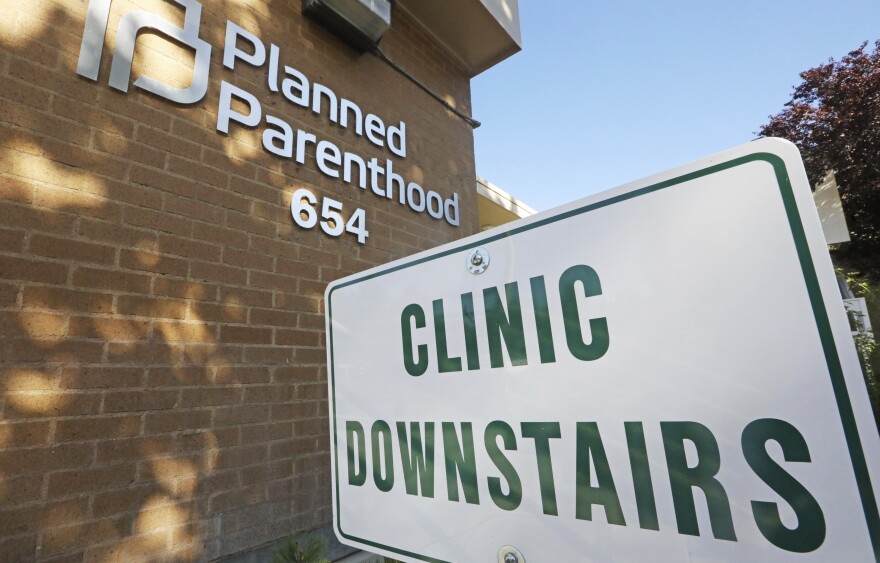A regional arm of Planned Parenthood filed suit in the Idaho Supreme Court Wednesday to block the implementation of the state’s new Texas-style abortion ban, calling it an “unprecedented power grab.”
The law takes effect April 22. Without an injunction to block its implementation, family members of the expectant parents could sue a doctor who performs an abortion after six weeks of pregnancy.
If convicted in civil court, those doctors would have to pay at least $20,000 per case.
“This law is a cruel overreach by politicians so intent on controlling the lives of their constituents that they’re willing to compromise our constitutional rights and compromise our health and safety, all in order to ban abortion,” said Rebecca Gibron, interim CEO of Planned Parenthood Great Northwest, Hawaii, Alaska, Indiana, Kentucky.
The group operates three clinics in Idaho that provide abortions in Boise, Meridian and Twin Falls.
Dr. Caitlin Gustafson, a family physician in McCall, drives to Planned Parenthood’s Meridian clinic each month to perform abortions and signed on to the suit.
“Senate Bill 1309 puts Idahoans’ health and futures into the hands of politicians,” Gustafson said during a press conference Wednesday. She didn’t take questions from the media.
Gov. Brad Little signed the bill into law last week, though a letter explaining his decision read more like a veto.
Little wrote he fears the civil enforcement mechanism in the bill will be proven “unconstitutional and unwise” “in short order.”
“Deputizing private citizens to levy hefty monetary fines on the exercise of a disfavored but judicially recognized constitutional right for the purpose of evading court review undermines our constitutional form of government and weakens our collective liberties,” he wrote.
At issue is a legal term called standing. That’s where a person bringing a civil lawsuit must prove they have been, or will be, directly harmed by another party’s actions or a law that’s being challenged.
States enforce laws passed by their respective legislatures, but the new Idaho law passes that responsibility off to its residents. It explicitly forbids state officials and prosecutors from getting involved with these civil cases.
Attempts to overturn Texas’s similar law are ongoing andhave been met with legal defeats. New attempts to challenge the statute in technical wayswere filed just this month.
Planned Parenthood’s challenge to Idaho’s law also focuses on these technical reasons.
The group argues the legislation violates the state constitution’s separation of powers among the three branches of government – namely that the executive branch and its governor “shall see that the laws are faithfully executed.”
It’s “a brazen, naked, and unlawful attempt by the Idaho Legislature to encroach upon and strip the Idaho executive branch of its core power and discretion,” Planned Parenthood argued in the court filing.
Among other claims, the group also argues the law imposes “excessive” and “vague” penalties. While a doctor who performs an illegal abortion would owe a plaintiff a minimum of $20,000, there’s no maximum amount, nor are there guidelines to help judges or juries calculate a larger penalty.
The Idaho Family Policy Alliance, which sponsored the bill, didn’t immediately respond to a request for comment.
A spokesperson for the Idaho Attorney General’s Office declined to comment on pending litigation.
Should the law take effect, pregnant women in Idaho would have to travel hundreds of miles out of state to reach the nearest clinic. For example, the closest Planned Parenthood clinic to Boise is about 260 miles away in Walla Walla, Washington. The clinic in Salt Lake City, Utah is 218 miles from Twin Falls.
Travel, lodging, child care and other expenses could limit the number of women who could afford to get an abortion.
Gibron said Planned Parenthood is raising money to help offset, or completely cover, those costs for patients
“I want to ensure and do everything we can to remove every possible financial barrier for our patients who are going to need to travel out of state,” she said.
A spokesperson from Planned Parenthood didn’t offer further details about the program, but said patients can contact the organization for assistance in getting an abortion.
Follow James Dawson on Twitter @RadioDawson for more local news.
Copyright 2022 Boise State Public Radio




